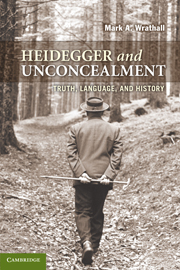Book contents
- Frontmatter
- Contents
- Acknowledgments
- Credits
- Introduction
- Part I Truth and Disclosure
- 1 Unconcealment
- 2 The Conditions of Truth in Heidegger and Davidson
- 3 On the “Existential Positivity of Our Ability to be Deceived”
- 4 Heidegger on Plato, Truth, and Unconcealment: The 1931–1932 Lecture on The Essence of Truth
- Part II Language
- Part III Historical Worlds
- Works by Heidegger
- Index
- References
4 - Heidegger on Plato, Truth, and Unconcealment: The 1931–1932 Lecture on The Essence of Truth
Published online by Cambridge University Press: 05 June 2012
- Frontmatter
- Contents
- Acknowledgments
- Credits
- Introduction
- Part I Truth and Disclosure
- 1 Unconcealment
- 2 The Conditions of Truth in Heidegger and Davidson
- 3 On the “Existential Positivity of Our Ability to be Deceived”
- 4 Heidegger on Plato, Truth, and Unconcealment: The 1931–1932 Lecture on The Essence of Truth
- Part II Language
- Part III Historical Worlds
- Works by Heidegger
- Index
- References
Summary
In the 1920s and 1930s, Heidegger repeatedly offered lectures and seminars largely devoted to the topic of truth. His evolving thoughts on the nature and philosophical significance of truth, however, made their way into relatively few publications, and when they were published, they tended to come in an incredibly condensed and enigmatic form. The main published works from this period include Sein and Zeit (1927), and essays like “Vom Wesen des Grundes” (1929), “Vom Wesen des Wahrheit” (1930), and “Platons Lehre von der Wahrheit” (1942).
With the publication of Heidegger’s notes from his lecture courses, it is now becoming possible to connect the dots and flesh out Heidegger’s published account of truth. These lecture courses are not just of historiographical interest, however. In them, we find Heidegger working out an account of the way that propositional truth is grounded in a more fundamental notion of truth as world disclosure. He also struggles to develop a phenomenology of world disclosure, and it is in these lecture courses that Heidegger’s later view on the history of unconcealment and being develops. He also argues that the phenomenologically enriched notion of truth has normative implications for the way that we conduct ourselves in the world. I review in this chapter Heidegger’s thought on these matters as developed in a lecture course offered winter semester 1931–2: The Essence of Truth: On Plato’s Cave Allegory and the Theaetetus (GA 34).
- Type
- Chapter
- Information
- Heidegger and UnconcealmentTruth, Language, and History, pp. 72 - 92Publisher: Cambridge University PressPrint publication year: 2010



